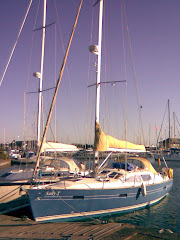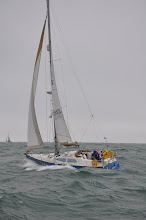...or, in French, mâtage. Well, we found the mast, and it's up, and we hope it will stay that way. It was a hard working, and quite stressful 3 days in Pauilac. The actual raising of the mast only took an hour or so, but there was rushed preparation, and quite a lot of sorting to do afterwards. The raising was a joint effort with harbour staff - and our french wasn't really up to "tighten up on the starboard lower shroud" or "lock the cleavis pin on the backstay tensioner". With all that we missed out a bit on the glories of Pauillac, and in particular the vinyards that we might have visited/ sampled. Still, we did manage a Sunday lunch on the boat with fresh local oysters and local Entre Deux Mers.
We're now in La Rochelle. It's a really pleasant and interesting city. Splendid entrance to the harbour
and a very attractive atmosphere. We're actually sitting in a huge, 3000 boat marina, and there is boating activity everywhere. A proper place. For some reason the tourist blurb doesn't dwell too much on the siege. 27,000 inhabitants - mainly protestant civilians - killed according to Wikipedia. Still, it was a long time ago.
We continue North tomorrow - the weather seems to be improving the nearer England we get. There will, I'm sure, come a point where this ceases to be true...
Subscribe to:
Post Comments (Atom)



If in your next leg (s) you touch land near La Trinité-sur-Mer.
ReplyDeleteHave a look at the Carnac stones are an exceptionally dense collection of megalithic sites around the French village of Carnac, in Brittany, consisting of alignments, dolmens, tumuli and single menhirs. The more than 3,000 prehistoric standing stones were hewn from local rock and erected by the pre-Celtic people of Brittany, and are the largest such collection in the world.[1] Local tradition claims that the reason they stand in such perfectly straight lines is that they are a Roman legion turned to stone by Merlin or Saint Cornelius – Brittany has its own local versions of the Arthurian cycle. A Christian legend associated with the stones held that they were pagan soldiers in pursuit of Pope Cornelius when he turned them to stone.[2][3][4]
Alistair
Hi Simon and Val,
ReplyDeleteWe've just been catching up on your epic journey so far. The weather in England has certainly taken a turn for the worse in the last few days. Maybe it's getting ready for your return. Incidentally, what does "lock the cleavis pin on the backstay tensioner" mean in English, never mind French? It sounds like something out of Patrick O'Brian!
Hope all continues to go smoothly.
Steve and Jean